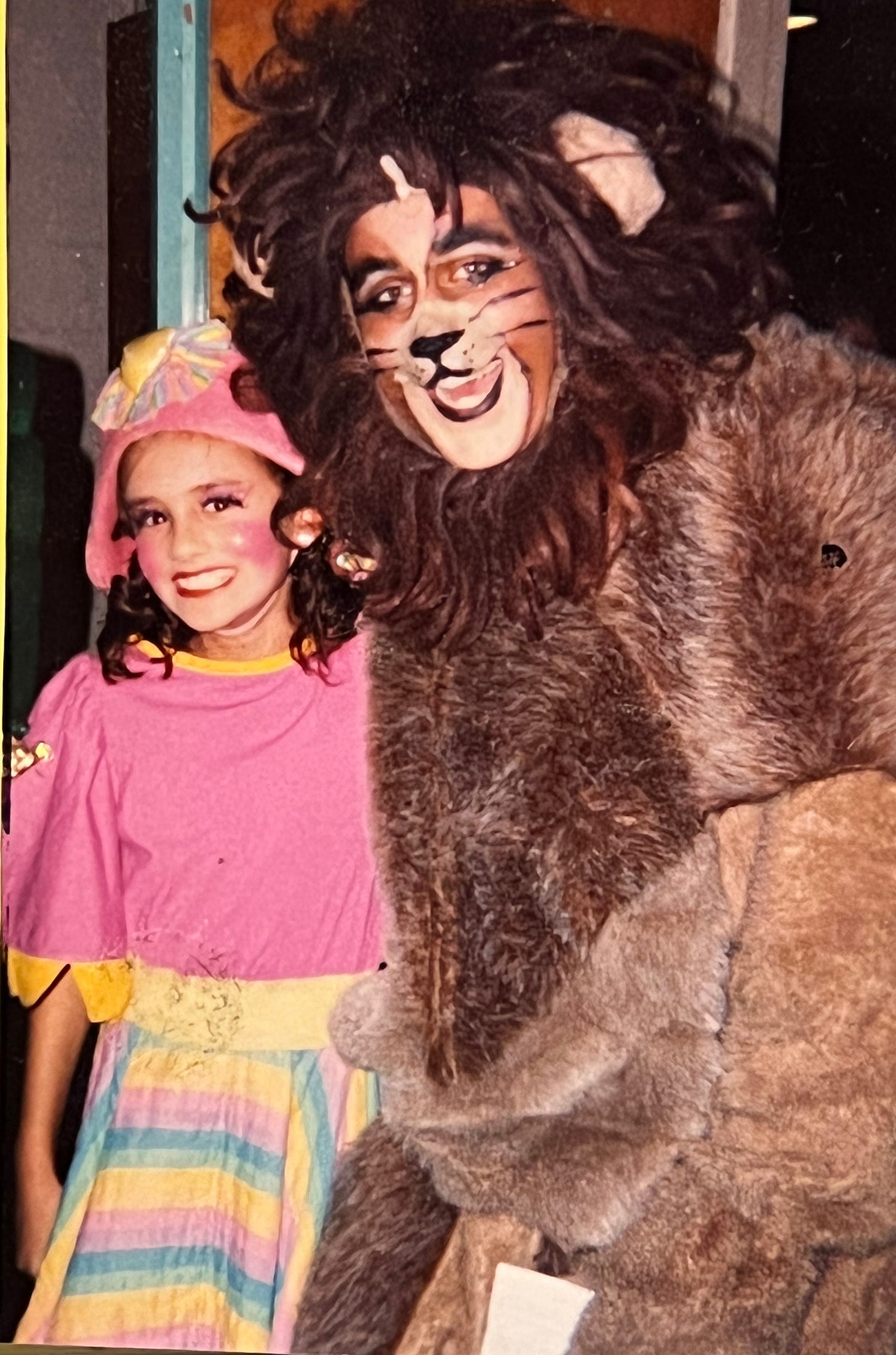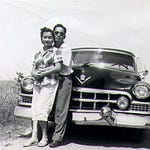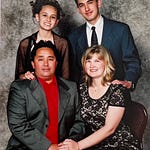My aunt Shannon took me to my first play. I’d been having a hard time at home, which is a nice way for adults to describe a child experiencing emotional turmoil. The play was Jungle Book and was performed at a dingy middle school that might as well have been the Vatican for how grand it all was. Kids with their faces painted like monkeys danced up and down the aisles of the auditorium, flipping their tails around. I sat back in my squeaky wooden seat, stunned, possibilities taking shape before my eyes. Is this something you’d be interested in doing? She asked.
Granted permission, I sank my teeth in slowly and eventually held on for dear life.
Participating in so many productions made my dad understandably resentful. It gave me an attitude. It put unnecessary stress on my family because we had to drive into town from the country.
My parents were young and exhausted. They didn’t have time to do the required free labor in addition to paying the production fee for me to be in the show. They barely collected me from rehearsals on time. Often I loitered under a lamp buzzing with bugs, the supervisor looking around for them.
My panic would grow and grow as wide as the parking lot, maybe they just forgot, should we call them again? but no, there they were — when they’d finally pull up, the relief was tear inducing.
I couldn’t trust them, but even then, I knew it wasn’t their fault. Mom was barely hanging on, caring for the four of us. Dad still attended at least one performance per show, drained from work with his briefcase and business clothes, having leased cars all day. I wanted him to see the opulence, the wonder of it all, the need.
He would occasionally send me a Candy-Gram during intermission — a scribbled note with a bag of Skittles or a roll of Sweet Tarts attached, his scratchy handwriting impossible to miss. Getting these Candy-Grams was huge for me. He didn’t even like musicals. I learned early to interpret these gifts as pride, as giving what he could. I knew this was his way of letting me know he cared. Most of all, he was letting me do it.
Public displays of confidence were hard to come by, which was counterintuitive to theater on the whole. There was something about the kids whose parents were heavily involved, a breeziness maybe. I belong here, it seemed to say, this territory is a family affair.
One family never had to volunteer because they had so much money, their last name forever plastered in the back of every single play program. Who knows how much they had donated to the cause. They owned a huge self storage company and didn’t have to work, so they did what some people do when they know their parents will take care of them. They were pastors. What must that feel like, I wondered?
You’re not even a lead role, dad would say, why do you want to keep doing this?
I understood that art wasn’t for people like me, that it wasn’t worth people’s time unless you were at the very top. His words made me a realist — I knew I wasn’t good enough for a lead. But being a part of something, a shared craft, was so intoxicating that I begged incessantly to audition again. Home was infested with screaming babies and schoolwork I could barely do; I cherished leaving, nursed fantasies of it.
Sometimes a kid takes an adult’s disbelief and turns it into fuel, proving them wrong. You’ll see, some kids say. I’ll show you.
But my father’s disbelief debilitated me, and I only ever seemed to prove him right: that it was all a waste of time, that mediocrity would forever linger above me like a cloud.
There was no security trampoline on which I could just bounce back. The only security was recognizable success. There were people who tried to encourage me in artistic ways, but it was impossible to believe them. It would have been like telling my dad he was wrong.
By some miracle, I was eventually cast as a lead role by a director who had written his own musical. He saw more to me — more than the meek, mousy, and horrified shrimp I apparently was, long before anyone else did.
At home there were jokes of me starring as a rock or a tree, since I usually just stood onstage with the 80 other cast members, singing the one song all the Townspeople were in. But this would be different, this was once in a lifetime.
It felt like success or recognition was deserved by others but accidental with me, like a lottery.
Certain adults made sure to let me know they’d been confused when I was picked, which, looking back, just makes me sad for them. Catty moms with too much time on their hands, all at least a decade older than my mom, well dressed with litters of white children. I felt like a little peasant to them sometimes.
Having a lead role equated to being friends with exclusively white popular kids, who appeared just as startled as me at who had landed it. Were they popular because of their whiteness, because of their proximity to power within the program, or were they popular because of their talent, confidence, or wealth, or was it an amalgamation of all those things?
Nevertheless we rehearsed together now, and I was finally one of them. This was vindicating for sixteen year old me. Was this how the popular kids felt all the time? Not only that, but we got to do the play at a Real Venue in downtown (instead of an ugly middle school).
It was my first taste of position directly correlating to how I was treated. At home, I either cleaned, babysat, hid to read my books, or wandered around outside, going on long walks to avoid schoolwork and chores.
At theater, I felt appreciated for doing something I enjoyed — I had no responsibilities but to entertain. It was a freedom I’d tasted rarely, an escape.
Across the run of that show I had a sort of unspoken immunity at home and I wanted to feel like that all the time. Prized, like an asset. Being perceived as valuable was absolutely addicting.
You were supposed to find value in The Lord, of course, it being a religious institution. Praising His Holy Name was supposed to wash away all that other shit. Yet finding worth in roles was inevitable, because popularity hinges on prevalence. The bigger the roles you had the more you were there, convening with the gatekeepers. My relationship with The Lord was feeble, rife with double-think, fixed as one of two options — the other option being total effing paganism.
If you weren’t a lead, the next best thing was Dancer or Ensemble — an elite group of 10 - 12 kids with more scenes and responsibilities. They had a different alias each show but you always knew what it was, because it was comprised of more or less the same twelve children every time.
When I wasn’t a lead role (so, mostly), my father would threaten total theater bans. The fact that my mother had to go to bat for me in these moments chipped at morale over a period of years. It became a little a routine: dad saying no, mom saying please, me begging, me promising a good attitude and hard work.
Art was precious, something you fought for, not something just anyone deserved. It had to count. My family’s harmony was on the line; in fact, maybe it was my fault everyone was so grumpy.
Did I really deserve to keep doing something that upset people? It gradually turned me into a soggy teabag, steeped too long in other people’s doubts.
Trained to believe the things they said to me, the roles they gave me, turning to the attention they bestowed like a baby to a tit.
Kids around me were thinking about college, future plans. But my endurance was limited to the institution most immediate to my present. After a show once, a random uncle mentioned Juilliard. I didn’t know what that was, but it didn’t matter because finally being accepted here felt so fine. I was being perfectly primed to believe that branding mattered. I was getting a lifelong lesson in the reason people love alumni license plate frames and country clubs and sports. Because belonging somewhere is a life requirement.
Maslow’s famous hierarchy of needs reasons that physiological and safety needs must be met before a person can move to higher needs, such as belonging, love, esteem, and self actualization.
If I’m to apply Maslow’s hierarchy, I see how I got stuck on belonging for what would be years to come. I can see how settling into that purpose kept me from going so much further.
I see clearly each moment where feelings of exclusion came down upon me and who triggered them. I remember each time the pit of my stomach twisted with a sickness that could only be cured by experiencing actual community— the kind you don’t have to pay for. The kind you don’t have to prove yourself to. The kind where you’re accepted for being who you are. The kind families are supposed to embody but so many don’t.
I understand why belonging was so important to me for so long, and I no longer blame myself. I see myself back then as this scrawny baby person with such a limited worldview, such a messy focus, unaware of all the options, going wherever the wind dropped them. I’m speaking to them directly when I say the sky is the limit, my dude. If you don’t know how, then let’s find out.












Share this post